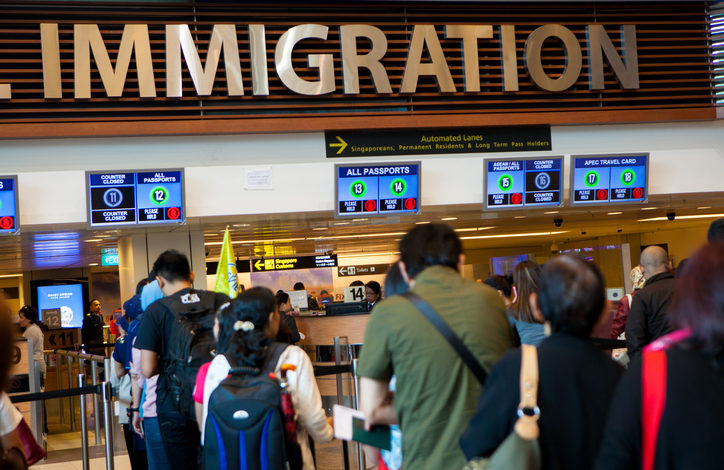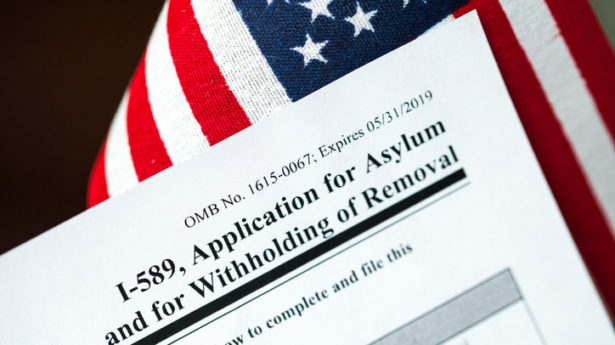The Unitarian Universalist Service Committee advances human rights through grassroots collaborations.
Check Your Privilege: A Merit-Based Immigration System Will Not Work

By UUSC Staff on May 23, 2019
On May 16, President Trump proposed a new immigration system to the press and fellow politicians, which he claims will be “merit-based.” This means the system will decide whether someone can come to the United States based on their age, educational attainment, work experience, English comprehension, and financial status. What this proposed system fails to address are the many other ways immigrants contribute to this country—and the many humanitarian reasons why people often have to leave their homes against their will.
What happens to the asylum-seekers?
There are thousands of asylum-seekers fleeing their home countries because they are forced to. They face a multitude of problems including—but not limited to—sexual violence, corruption, and poverty. In Trump’s speech, he mentions the fictitious problem of having a “broken asylum system,” but not once did he give a concrete plan to address it. He dismisses it by saying if you have a legal asylum claim, you will be admitted, and if you don’t, you’ll be deported. This statement lacks empathy and understanding of what truly is happening at the border and what asylum-seekers face every day. UUSC has extensively documented the various challenges and problems that asylum-seekers experience in detention facilities, both known and unknown.
Another misleading statement in Trump’s speech came when he referred to “closing legal loopholes” in the asylum system. What this most likely means is that Trump continues to back his long-standing plans to extend the period of time that families with children can be held in detention. This is one of many avenues this administration has pursued to weaken asylum protections and make the process more onerous for families.
But Trump said he will remove all incentives for smuggling children—isn’t that good?
It sounds great, but it’s not the truth. Trump claims his plan will, “change the law to stop the flood of child smuggling and to rapidly reunite unaccompanied children with their families back home.” What he is really referring to are the legislative proposals his administration has long backed that would end the legal right of Central American children to a guaranteed hearing before an immigration judge.
Currently, under the Trafficking Victims Protection Act, all unaccompanied children from Central America who cross the border are exempt from the “expedited removal” process that applies to most asylum-seekers. This means they are entitled to a full hearing of their asylum case with an immigration judge, before they can be deported.
What Trump is proposing in effect is to eliminate this right, which would mean that unaccompanied children from Central America would have to pass an initial screening by Border Patrol and a credible fear interview with an asylum officer before having their case heard in court. Many children who urgently need humanitarian protection would be unable to clear these hurdles, especially without legal representation along the way.
This evisceration of the legal rights of Central American children—rights designed to protect trafficking victims—is what Trump really means when he duplicitously talks about returning children to “their families back home.”
What happens to the Deferred Action for Childhood Arrivals (DACA), Deferred Enforced Departure (DED) and Temporary Protected Status (TPS) holders?
Trump’s speech didn’t mention any form of relief or solutions for the millions of long-term U.S. residents who hold such statuses. It is critical to remember that these immigrants are legal U.S. residents whose statuses were placed in jeopardy because of Trump’s own decisions.
The lack of acknowledgement on this matter makes us believe that Trump’s “merit-based” immigration agenda is based more on his desire to satisfy his political base, rather than a good-faith effort to craft a comprehensive immigration proposal.
What about the millions of undocumented immigrants?
There is also no clear answer as to what Trump and his administration want for the millions of undocumented immigrants that hope for a path to citizenship. The lack of addressing this problem begs the question of whether Trump’s real motivation is to continue preserving the status quo and his ability to continue deporting people, at the expense of genuine long-term solutions.
How does the merit-based immigration system affect the current visa offerings?
When Trump refers to his new visa system, he is taking aim at the current family-based visa categories, as well as the diversity visa which opened the doors for the U.S. to be a multicultural society. Family-based migration—which Trump often refers to by the derogatory name of “chain migration”—has been the bedrock of the U.S. immigration system since the 1965 Immigration and Nationality Act. This act was passed in the midst of the civil rights era and reflects the racial justice ideals of that time. Family preference migration made possible the diversification that characterized U.S. society for the last 60 years. This system replaced an earlier racist “nationality quota” system that favored white European immigrants. By taking an aim at family migration, Trump is again undermining the basis of multicultural immigration and the foundation of the nation’s immigration laws.
Another visa offering affected by this proposed system is the Diversity Visa, which allows immigrants from various countries to apply for U.S. citizenship. This visa is one of the principle avenues through which people from Africa are able to migrate to the United States. Trump has repeatedly attacked this program, invoking racist tropes in the process. In short, Trump’s new proposal is in line with his repeated racist comments about immigrants of color.
The number of green card visas that will be issued will remain the same; however, this system plans to prioritize giving more to those who have a higher level of educational attainment and wealth. This will almost certainly favor immigrants from the developed world and more privileged backgrounds, at the expense of people from the Global South.
What happens now?
The proposed new merit-based immigration system is completely bogus, hazy, and all fluff. It is political posturing with Trump appealing to his base with a racist and divisive immigration plan that doesn’t address the root causes of migration. Although this proposal would have to be approved by Congress, House Speaker Nancy Pelosi has already dismissed it as a “dead on arrival plan” that will probably not move forward.
This doesn’t mean that we should sit on the sidelines and watch it disappear. This system highlights an individual’s access to wealth and privilege and undermines those who face a lack of opportunities for reasons beyond their control.
UUSC values the inherit worth and dignity of all people. We recognize that people’s “merit” cannot be reduced to just a “point” on an immigration form. We need an immigration system that creates opportunities and opens doors to all—not just to those who can afford to pay for it.
Photo Credit: iStock – rikirisnandar
***
About UUSC: Guided by the belief that all people have inherent worth and dignity, UUSC advances human rights globally by partnering with affected communities who are confronting injustice, mobilizing to challenge oppressive systems, and inspiring and sustaining spiritually grounded activism for justice. We invite you to join us in this journey toward realizing a better future!

